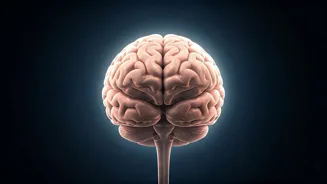Sleep and Cognition
The cardiologist highlighted that sleep is a fundamental requirement for cognitive processes, including memory consolidation, learning, and problem-solving.
During sleep, the brain effectively sorts and organizes information gathered throughout the day, solidifying memories and enabling efficient information retrieval. A lack of sufficient sleep can disrupt these crucial processes, leading to impaired cognitive abilities such as decreased attention span, poor decision-making skills, and difficulty with complex tasks. The cardiologist underscored that consistent sleep deprivation contributes to cognitive decline, making it challenging to perform everyday activities that require mental sharpness. This is further complicated by chronic sleep issues that can be linked to a higher risk of developing neurodegenerative disorders.
Brain Cleansing Function
A lesser-known aspect discussed by the cardiologist was the brain's 'glymphatic system,' which functions primarily during sleep. This system acts as the brain's waste removal mechanism, clearing out metabolic waste products that accumulate during the day. This waste includes proteins like amyloid plaques, which are associated with Alzheimer's disease. Sleep allows the glymphatic system to efficiently flush out these harmful substances, reducing the risk of neurodegenerative diseases. Insufficient sleep hinders this cleansing process, leading to a buildup of these harmful proteins and an increased likelihood of cognitive decline and brain damage. The cardiologist explained that the quality of sleep directly impacts the efficacy of this cleansing function, emphasizing the importance of not only getting enough sleep but also ensuring it's restful and uninterrupted.
Sleep and Emotional Regulation
Beyond its impact on cognitive function and waste removal, the cardiologist also emphasized the role of sleep in emotional regulation. Sleep helps regulate the brain's emotional centers, such as the amygdala and prefrontal cortex, that manage our moods. When individuals are sleep-deprived, the amygdala becomes more active, leading to increased emotional reactivity, while the prefrontal cortex, responsible for rational thinking and emotional control, is impaired. This imbalance makes individuals more susceptible to negative emotions like irritability, anxiety, and sadness. Furthermore, consistent sleep deprivation has been linked to an increased risk of developing mood disorders, including depression and anxiety. The cardiologist noted that achieving consistent, adequate sleep is a cornerstone of emotional well-being, allowing individuals to manage stress more effectively and maintain a balanced emotional state.
Improving Sleep Habits
To improve sleep hygiene, the cardiologist recommended several practical strategies. Firstly, establish a regular sleep schedule, going to bed and waking up at the same time every day, even on weekends, to regulate the body's natural sleep-wake cycle. Create a relaxing bedtime routine that includes activities such as reading, taking a warm bath, or practicing relaxation techniques to signal to the body that it's time to sleep. The cardiologist also suggested optimizing the sleep environment by ensuring the bedroom is dark, quiet, and cool. Avoid caffeine and alcohol close to bedtime, as they can disrupt sleep quality. Regular exercise, ideally earlier in the day, can also improve sleep, but avoiding intense workouts close to bedtime is important. Lastly, the cardiologist advised seeking professional help if sleep problems persist, as underlying medical conditions or sleep disorders may require specific interventions.














